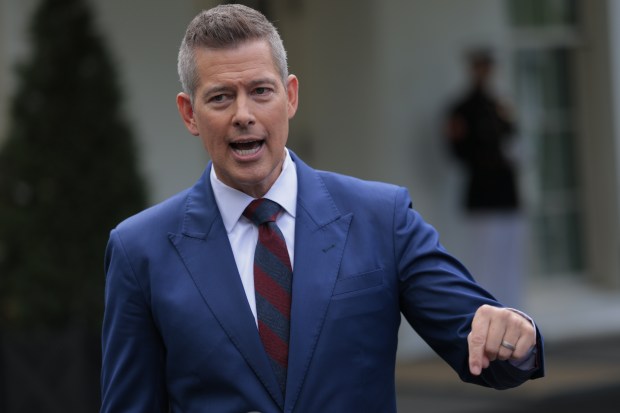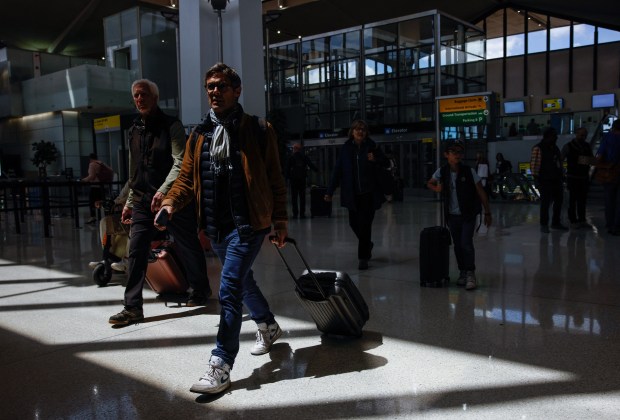Secretary of Transportation Sean Duffy on Sunday stressed that it’s safe to fly into and out of New Jersey’s Newark Liberty International Airport despite recently reported outages affecting the busy airport’s air traffic control systems.
At the same time, Duffy said the traffic at the busy airport would be reduced in an effort to reduce delays and cancellations.
“I fly out of Newark all the time. My family flies out of Newark. When we saw these two incidents, when we have issues, there are policies and procedures in place for controllers and for pilots. They know what to do. It is not ideal, by any stretch, but they do implement those procedures, and they stay away from each other, and vacate the airspace,” Duffy told NBC’s ‘Meet the Press with Kristen Welker’ in an interview Sunday.
Duffy’s reassurances come after it was revealed that the radar system tracking flights over New Jersey went black for a minute-and-a-half on Friday — the second time such an outage has been reported in as many weeks — and as the FAA revealed there was a brief “telecommunications issue” on Sunday at the Philadelphia facility that controls traffic for Newark.
Duffy warned that, if something isn’t done to fix the system, Newark may not be the only place that sees such outages.
The former Congressman said the root of the problem is that the technology used by the U.S. air traffic controllers is “25 at best, sometimes 50 years old,” and that both the public and Congress are just now beginning to notice because “the lights are blinking, the sirens are turning.”
“And they’re saying, ‘Listen, we have to fix this,’ because what you see in Newark is going to happen in other places across the country. It has to be fixed, and so what we’re having is some telecom issues, but we’re also having some glitches in our software. As the information comes in, it’s overloading some of our lines, and the system goes down,” he said.
Duffy also said that FAA staffing for the airport had been reduced after “we lost a few controllers who were stressed out by the first connectivity that we lost last week,” and that there are fewer controllers covering Newark’s airspace at the moment.
As a consequence, Newark will see a reduction in air traffic for the next “several weeks,” Duffy said, and passenger traffic will be prioritized so that passengers “don’t get to the airport, wait four hours, and then get delayed.”
Duffy did not specify how long “several weeks” is in practice, nor did he say precisely how much air traffic might be reduced. The former Fox Business host said in the coming days he’s “convening a meeting of all the airlines that serve Newark” in order to get those companies to agree on how they will alter their flight schedules, and indicated he expects connectivity issues at Newark to be solved “by the end of the summer.”
“We are building a new line that goes directly from Newark to the Philly [Terminal Radar Approach Control], which controls the New York airspace. What happens now is it goes from Newark to [New York TRACOM], which is where it used to be controlled, and then down to Philly. That doesn’t make sense. We’re going to have a direct line there,” Duffy said.
United Airlines CEO Scott Kirby confirmed the upcoming meeting during an appearance on CBS’ “Face the Nation” on Sunday.
According to Kirby, serious reductions in traffic to Newark will likely last until mid June, when a runway construction project is due to be completed, but traffic into New Jersey will likely see some restrictions through August.
Kirby said that he is “not concerned about safety at Newark or anywhere else” because the air traffic control system — as a whole — is designed to handle an occasional outage.
“What happens when these issues occur, they do occur sometimes at other places, is that we have those fallback procedures. We fall back on those procedures. We slow the airspace down. We have fewer flights, but we keep everything safe, and we get the airplane safely on the ground,” he said.
The FAA is currently running about 3,000 air traffic controllers short of optimal staffing, according to Duffy. As a stopgap solution while the administration tries to bring new controllers into the field, the transportation secretary said he will be upping the mandatory retirement age from 56 to 61 and is looking into providing bonus incentives for controllers who agree to delay their retirement.
“What I’ve done, I said, ‘Hey, listen. These are the best controllers we have in the airspace. Let’s give them a bonus. I’m going to give them a 20% upfront bonus to stay on the job. Don’t retire. Keep serving your country.’ And these are the best guys,” he said.
Last Thursday the Trump Administration unveiled a plan to overhaul the nation’s air traffic control system over the next several years.
The proposal, according to the White House, calls for replacing “outdated infrastructure with state-of-the-art fiber, wireless, and satellite technologies at over 4,600 air traffic control sites — including 25,000 new radios, 600+ new radars, and 475 new voice switches” and the construction of “six new air traffic control coordination centers.”
In unveiling the plan, Duffy did not give an firm estimated cost, but said that will price tag will be “billions, lots of billions.”










